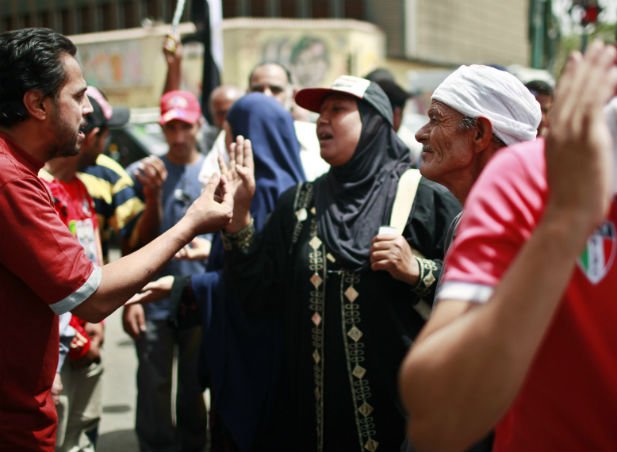Egypt is awaiting the delayed results of the presidential run-off election held last weekend.
The results are due in the coming hours, after the election commission heard appeals by the two candidates.
Mohammed Mursi of the Muslim Brotherhood and former Prime Minister Ahmed Shafiq have both claimed victory and vowed to form unity governments.
Thousands of their supporters spent the night in the centre of Cairo amid increasing political polarization.
Correspondents say the atmosphere has been peaceful, but tense.
Many people are still apprehensive about the intentions of the ruling generals, who gave themselves sweeping new powers last week after the Supreme Constitutional Court ruled that the Islamist-dominated parliament should be dissolved.
On Friday, the Supreme Council of Armed Forces (SCAF) called on supporters of both candidates to accept the result when it came.
Results from last weekend’s run-off were originally due out on Thursday.
The Higher Presidential Election Commission (HPEC) has said that it will announce the official results at 15:00 local time (13:00 GMT) on Sunday.
Muslim Brotherhood supporters are maintaining a vigil in the capital’s Tahrir Square, where on Friday tens of thousands of protesters gathered to denounce a series of decrees and appointments by the SCAF designed to reduce or constrain the power of the president, and entrench the power of the military.

On 13 June, the military-controlled government gave soldiers the right to arrest civilians for trial in military courts until the ratification of a new constitution.
Four days later, just as the polls were closing in the presidential run-off, the generals issued an interim constitutional declaration that granted them all legislative powers and reinforced their role in the drafting of a permanent constitution. The document also exempted the military from civilian oversight.
Then on Monday, the head of the SCAF, Field Marshal Mohammed Hussein Tantawi, announced the re-establishment of a National Defence Council, putting the generals in charge of Egypt’s national security policy.
Islamists, liberals and secularists said the moves amounted to a coup.
“The military must leave its political role and go back to its basic role which is protecting the country, not continuing to ruin the country and people’s affairs – this will not be accepted by the Egyptian people,” Abdel Nasser Hijab, a demonstrator in Tahrir Square, told the Associated Press.
There are fears that in the current atmosphere, the announcement of the presidential election results might only make matters worse.
A pro-Ahmed Shafiq demonstration took place on Saturday in the Nasser City neighborhood of Cairo.
“When we decided to take to the streets, we’re not just one, two or three million, we’re 80 million. The only difference is that we’re waiting for the military council to give its final word,” one Shafiq supporter, Doaa, told the Reuters news agency.
Hundreds of supporters held up pictures of Ahmed Shafiq and Field Marshal Tantawi while chanting slogans in support of the army and against the Brotherhood.
Correspondents say that there was less enthusiasm in the run-off election than there was for previous rounds of voting, and some called for a boycott or spoiled ballots.
On Tuesday, the Brotherhood’s Freedom and Justice Party announced that Mohammed Mursi, its chairman, had won with 51.74% of the vote, citing official figures from the HPEC.
Mohammed Mursi has also secured the support of several leading liberal figures and youth activists in Egypt, including Wael Ghonim, who played a key role in the uprising that forced Hosni Mubarak to step down in February 2011.
Ahmed Shafiq came second to Mohammed Mursi in last month’s first round, in which turnout among the 52 million eligible voters was only 46%.
But the former air force commander, who served briefly as former President Hosni Mubarak’s last prime minister, said on Thursday at his first public appearance since the run-off that he was confident of victory.
